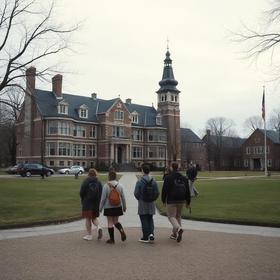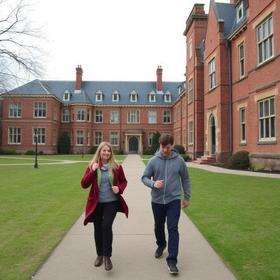Read more details about Northfield Mount Hermon on their 2026 profile page.
Reflections and Advice:
1.) What do you think makes your school unique relative to other boarding schools?
NMH teaches in many ways. There are the expected academics, which are rigorous and challenging (two heavily overused words), but also exciting, engaging and fascinating. Then there is the work program; since NMH's tiny beginning as the Northfield Girl's Seminary in DL Moody's house, and later the Mount Hermon School for Boys, students have been expected to fulfill a work requirement. In the earlier years, students might work as much as 10 or 15 hours a week. Now everyone is required to work only 4 hours a week in some aspect of campus life-- cleaning dorms and classrooms, chopping vegetables, wiping counters, washing dishes, mucking stalls, making cheese, harvesting raspberries, tour guiding, hanging lights, building sets, etc. While pretty much everyone ends up working in the dining hall at some point, and many of the jobs assigned are "unglamorous," working with the people who help to keep the school running clean, efficient, with good food and so on teaches through hands on experience what it really means to be a part of a community and gives students new understanding of the people that work behind the scenes to make our lives go smoothly. This is a different kind of academics. It teaches about responsibility, and life, and something about the real glamour of non-glamorous work. It also gives opportunities to gain valuable practical experience that can assist in finding work and finding a passion for things like theatre tech, farming, and running radio stations that regular academics can't teach. Then there are the people, and I think this is what makes NMH what it is, and I think this is where NMH really teaches. NMH supports a diverse population of students (another word that is overused, diversity), twenty percent of whom actually live in the area as day students, an equally large proportion of whom come from different parts of the world (most of them from the other side of it). The value of this diversity is that in encountering differences in people, and different people, while attempting to face and deal with issues that arise from these differences, we learn more about ourselves, about each other, and the world. And this works because NMH strives not to shape us into one ideal but to help us find out what and who we want to be, guides us in reaching and reaching for that person, and opens us to new ideas who who that might be, all the while hinting that that person is already inside us. The amazing faculty play an enormous role in supporting this process. Because there is this third academics, this third area of learning that has more to do with ourselves and each other and becoming and understand ourselves and each other, which runs through all parts of life. It comes out in the classroom, on the playing field, in the concert hall, in the kitchen, in the dorm, in the library... We all hear the school mission statement about "the head the heart and the hand" over and over again. It wasn't until I was graduating that I began to realize fully what that had meant.
2.) What was the best thing that happened to you in boarding school?
Well, NMH helped me find myself. I was given a lot of opportunities to pursue independent work in costume design (including doing it as a work job) and to follow my determination to be a theatre person, and having the support to do that was really good for me. I also had some interpersonal drama that, while it was upsetting, pushed me over the edge between self-pity and self-reliance and I grew up a whole lot. It also really pushed me to be a real person rather than to be what I was "supposed to be."
3.) What might you have done differently during your boarding school experience?
I don't necessarily regret anything I did at NMH because I learned a lot from my mistakes, but I do wish I could have taken more dance and art classes, and not stressed out as much about college as I did. And I now also wish I had actually pushed myself to continue with a sport. I just didn't feel like I had the time to do a sport and do my arts.Try something you don't expect to. If you are a sporty person, try out some of the arts. If you are an artsy person try the sports.
4.) What did you like most about your school?
Oh, the people, of course.
5.) Do you have any final words of wisdom for visiting or incoming students to your school?
The chapel is actually a really nice place to sit in if you need to get away from people for a bit, or to play sardines in on a Saturday night. Farm work job is amazing and you can do sugaring during spring break and not have to to do work job during the semester. It's hard work but it's a lot of fun. Be creative with the dining hall food. And try to learn as much as you can from as many of the people you meet as you can. It's not often you will be surrounded by the kind of people NMH supports. Also, if you sit on the rocks above the football field and shout it echoes off the gym quite nicely.
Academics:
1.) Describe the academics at your school - what did you like most about it?
NMH has a very informal atmosphere - students sometimes go to class in their pajamas. This is acceptable because there is an awareness that what you are wearing or how recently you got up don't have a bearing on your value as a student. The faculty are incredible. My teachers guided me not only to realize that "yes, I can do math" but that the reason I couldn't before was because I thought I couldn't. They were concerned not with my grade as much as with whether or not and how I was thinking. They pushed me not to regurgitate information but to understand it and engage with it. And they taught me as much outside the classroom about thinking as inside. The workload was sometimes immense and hard to bear but getting through it and thinking, "I did that, and I did that well," was immense and empowering. It was also really wonderful to be in classrooms full of other students who cared and who worked as much as I did. We helped each other stay on the ball. There was competition, but it wasn't the kind where we backstabbed each other; rather the kind where the excellence of the other students encouraged and challenged us to push ourselves.
Athletics:
1.) Describe the athletics at your school - what did you like most about it?
I am not an athlete. I never have been and the likelihood at this rate that I ever will be is very slim. When I first arrived at NMH I didn't think much about the athletics, nor did I care that they were struggling in many areas while we transitioned between two campuses to one. By my senior year, though I still was not involved on the fields, my friends were succeeding on the fields, the river, the mountains, the courts and the track. I don't know a whole lot about specifics, but I know our teams are up there in their leagues, and since most of our coaches also teach classes I can tell you there are some brilliant people on the fields and in the boathouse. There is a mandatory athletics requirement - my freshman year I had to do one trimester of a sport and two PEs, and supposedly after that I would have just had to do PEs. The athletics requirement has since gotten bigger - and more imposing for the arts (especially performing arts) students - and I've been grumbling about it since it began. (I don't think it's unreasonable to expect students to fulfill some kind of energy intensive activity, but being forced to be on at least one athletic team does make it more challenging to be involved in the performing arts department). However, it is possible to fulfill the requirement as a non "sporty" person by being on or managing the dance company (managers act as understudies so you still have to be active). Aside from my grumbling about having to do it, the PE programs are varied. I did fencing two years in a row and it was great fun, great exercise and suited my style.
Art, Music, and Theatre:
1.) Describe the arts program at your school - what did you like most about it?
Between by freshman year and senior year NMH downsized from two to on campus. Formerly, all of the arts facilities - the art building, the theatre, the dance studio, and the actual music hall - were on the Northfield campus (there was a music building on Mount Hermon, but it had formerly been the Laundry). After my freshman year we consolidated everything to Mount Hermon. We were still going to use Silverthorne (the black box theatre on Northfield) for our theatre productions (busing audiences between campuses) but at the end of my sophomore year structural issues were discovered in the roof of the old building, Stone, that housed the theatre and we were unable to continue using it. So, for the most significant part of my time at NMH there were no real facilities. The music and the theatre departments had to share performance spaces in the mount hermon music building -- a room with floors tiled in a zig-zag pattern and windows on three sides. Not only did this prove logistically complicated, it meant that occasionally the choir had to practice in makeshift spaces, while the theatre productions had to rehearse in the mods until the last possible minute. The dance companies used large wood-floored rooms and hung curtains and portable light and sound systems in Grandin Auditorium for their concerts. In short, the only arts program that didn't have to cope with completely inadequate facilities was the visual arts, but they were all the way down at the bottom of campus by the farm and it took fifteen minutes to walk to class from the dining hall. However, limitations often inspire creativity, and the less than state-of-the-art state of the arts facilities allowed the determination, strength and resourcefulness of the people to really shine. We learned to share spaces with one another, adjusted and adapted to spaces that weren't designed for the uses we were putting them to, but found ways of fitting ourselves into them. In short, rather than losing quality in the face of adversity we discovered that if we met those challenges with a will there was a way, and we could succeed brilliantly.
This was largely thanks to the encouragement of the faculty, who are all seriously brilliant, dedicated people, serious about their work and about really helping students to bring forward their creativity. Our choir program is probably one of the strongest around, and certainly holds its own. Likewise, the theatre and the dance we do at NMH is not typical high school theatre. In fact, none of the arts faculty ever let us get away with "mediocrity." We performed enormously complex classical pieces in choir; our dance company productions were mostly made of fascinating student choreography; and our theatre productions had traditional and experimental aspects to them, solid design, and everyone knows their lines. We perform well, we pulled off enormously complex and challenging pieces beautifully because Sheila (choir director), Steve (orchestra conductor), David (theatre), Charles (theatre), and Gretel and Amanda (Dance) tell us we can
Extracurricular Opportunities:
1.) Describe the extracurriculars offered at your school - what did you like most about it?
There are too many activities to be able to do them all, and my extracurricular involvement in theater prevented me from joining many clubs for the sake of my sanity. However, there were lots of opportunities and while costuming and being in theatre productions and touring with the choir and managing the dance company kept me busy enough on top of academics many of my friends enjoyed taking part in the various on campus organizations. International Carnival, where the various international student clubs make traditional foods and sell it in the dining hall to raise money for various organizations, is always a real treat, and there's always a lot of really tasty food.
Dorm Life:
1.) Describe the dorm life in your school - what did you like most about it?
As a day student it was really wonderful to have a room, shared with 13 or so other girls, in which I could leave my stuff, to spend the night if and when I needed to. Often, day students can get left out of the social and community life of the school, but with 20% of the student body commuting to school and since we were allowed to spend weekends at school whenever we chose, it was very easy to integrate. People often forgot that I wasn't a boarder, and it was much easier during tech weeks for theatre to live in the dorm for a few nights and save the hour of driving I would have had to do.
One thing that's been very different in college from NMH is that at NMH we had faculty living in the dorms with us, with their cats and dogs and families, so that while we were away from home, we could still bake cookies or hang out with some pretty cool adults. For me and many of my friends it was also good to live (or spend a lot of time) in a dorm with supportive adults who offered different perspectives from our parents and supported us to find ourselves and begin to grow up. My dorm also had an electric fireplace and a really nice kitchen so it was a great place to hang out on snowy winter days. There's a lot of camaraderie. There are a lot of rules about who can be where when after certain times of night (a lights out policy, and sign-in and sign-out around 10:30 pm and no boys in the girls dorm rooms no girls in the boys dorm rooms except under special circumstances) but you get used to it... And the structure can be helpful for a lot of people.
Dining:
1.) Describe the dining arrangements at your school.
Dining is also very informal. We have one big dining hall with an impressive array of options that allow for the grab and eat kind of food as well as creativity with the panini machines. It's a buffet style, and usually there are grazing hours so you can go in at anytime and get tea and toast or a sandwich. The food is pretty good, especially considering how much of it they have to make. It's not eating at home or at a restaurant, but there is always something good to eat and they do make good (if sometimes odd) quiches and soups. Stir fry days always have a long line, and Taco Thursdays are a particular favorite. They also have really tasty sweet potato fries. There are always vegetarian options and they can provide food for various dietary restrictions ( I had a friend who was vegan and allergic to wheat and soy, and they gave her her own small fridge in the kitchen for special bread and such so she could eat something besides fruit).
Social and Town Life:
1.) Describe the school's town and surrounding area.
NMH is surrounded by farmland and woods. It is beautiful. It is also not very near to anything resembling a traditional concept of a city. Greenfield, about a 15 minute drive away is quaint and has some nice restaurants and interesting shops, and if you put your mind to it getting off campus to go to the movies or go shopping a little farther afield is not too hard. There are taxis, and a free bus goes into town every Wednesday.
2.) Describe the social life at your school - what did you like most about it?
I've already sort of addressed this, but NMH was really a place where you could be yourself, or at least try to figure out who that is. There are of course the challenges of being in a place like any high school with lots of other people having similar or not similar existential identity crises, but even when it was tough to be an adolescent there were people who were there for you. It's big enough you can find a place to fit in, small enough you don't get lost.
Daily Schedule:
Weekday
6:30 AM
Wake up
7:00 AM
Drive to school
8:00 AM
First Class (say, AP English)
9:00 PM
Get home, homework, etc
10:15 AM
Second Class (say French IV)
11:30 AM
Third Class (Precal)
12:45 AM
Lunch! (sometimes lunch comes before third period. The schedule changes)
1:45 PM
Select Women's Ensemble (Tuesdays and Thursdays)
4:00 PM
Dance
7:00 PM
Concert Choir (Mondays and Thursdays)
Weekend
9:30 AM
wake up, go to breakfast
1:00 PM
rehearsal for something or meet up with somebody to work on costumes, hang out with friends
5:00 PM
dinner
6:00 PM
go out to a movie, hang out with friends, (there are campus events on the weekends I just didn't usually go)
Read more details about Northfield Mount Hermon on their 2026 profile page.
Alumni Reviews Review School
Review
Description
One of the unique aspects of attending NMH is the Work Job Program. It is a true equalizer and ensures that every member of the community contributes to and appreciates the work involved in operating. . .
NMH allows students to dive into the community and passions. The college like scheduled of four classes allowed me to seamlessly transition into college academics. Also NMH has a four hour per week work program. . .
Northfield Mount Hermon School helped me become the man I am today.The best thing about NMH was its sense of community. I like to think that I knew almost everyone there, while everyone knew me. . .
Show more reviews (12 reviews)
Recent Articles

What Boarding School Is Like in 2026: Life, Costs, Trends
Learn what boarding school life is like in 2026, including costs, routines, policies, trends, and planning tips for parents and students.

Famous Boarding School Alumni and What They Teach Parents (2026 Update)
Updated 2026 guide to notable boarding school alumni, trends in costs and enrollment, and what families should know when planning for boarding school.

How to Visit a Boarding School Campus: Parent Checklist
A step-by-step 2026 parent checklist for visiting a boarding school campus, from planning to post-visit evaluation.





